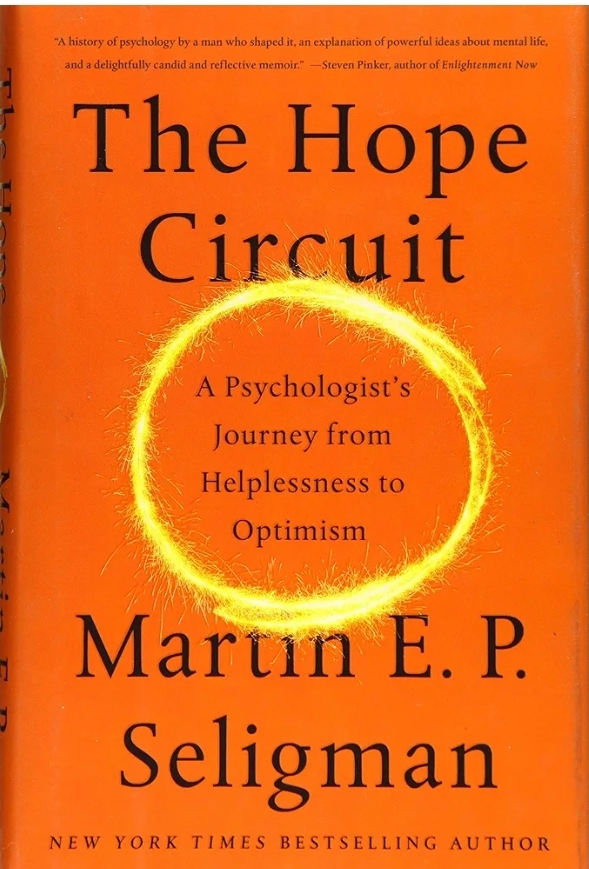Martin E. P. Seligman’s The Hope Circuit: A Psychologist’s Journey from Helplessness to Optimism is a memoir that blends the story of Seligman’s life and career with the evolution of the field of psychology. Seligman, widely regarded as the father of positive psychology, shares his personal journey from his early studies on learned helplessness to the development of the hope circuit and his revolutionary work on optimism, resilience, and well-being.
Here’s a detailed look at the book:
Themes and Structure
Personal Narrative
- Seligman recounts his upbringing, his academic struggles and successes, and his journey to becoming a prominent figure in psychology.
- He reflects on the formative experiences that shaped his perspective on human potential and the role of psychology in improving lives.
Evolution of Psychology
- The book outlines the trajectory of psychology over several decades, including the shift from behaviorism to cognitive psychology and, ultimately, to positive psychology.
- Seligman critiques the early focus of psychology on pathology and deficit, advocating for a more balanced approach that also emphasizes human strengths and flourishing.
The Hope Circuit
- Central to the memoir is Seligman’s concept of the “hope circuit,” a psychological mechanism that promotes resilience and optimism.
- He contrasts the hope circuit with the “helplessness circuit,” which explains why people sometimes give up in the face of adversity.
Key Concepts and Contributions
Learned Helplessness
- Early in his career, Seligman discovered the phenomenon of learned helplessness through experiments with animals.
- Helplessness occurs when individuals believe they have no control over their circumstances, leading to passivity and depression.
Shift to Optimism and Hope
- Seligman later realized that his focus on helplessness needed a counterpoint: how people recover and thrive.
- He developed research into learned optimism, demonstrating that people can train themselves to interpret setbacks more positively.
Positive Psychology
- Seligman founded the field of positive psychology in the late 1990s to focus on human strengths, virtues, and pathways to a meaningful life.
- He emphasizes the importance of studying well-being alongside mental illness.
The Hope Circuit in the Brain
- Advances in neuroscience show how neural pathways associated with hope and agency can be activated and strengthened.
- Seligman argues that by cultivating positive habits and thoughts, people can “rewire” their brains for greater resilience and well-being.

Key Lessons from the Book
The Power of Agency
- A sense of control over one’s life is crucial for mental health.
- Teaching individuals to develop a sense of agency can mitigate feelings of helplessness and promote growth.
Importance of Optimism
- Optimism is not just about positive thinking; it involves realistic hope and the belief that challenges can be overcome.
- Seligman’s research shows that optimistic people are healthier, more successful, and more resilient.
Psychology as a Force for Good
- Seligman highlights the responsibility of psychologists to use their insights for societal benefit.
- Positive psychology programs, such as those implemented in schools and the military, demonstrate the practical applications of his work.
Adversity as a Catalyst
- Seligman shares how struggles, both personal and professional, helped him refine his ideas and contribute to psychology.
Notable Stories and Insights
Academic Journey
- Seligman shares humorous and poignant anecdotes about his time as a student and professor, including interactions with famous psychologists like Aaron Beck and Albert Ellis.
The Founding of Positive Psychology
- Seligman recounts how his term as president of the American Psychological Association in 1998 became a platform for launching positive psychology as a legitimate subfield.
Challenges and Criticism
- He reflects on the skepticism and resistance he faced from colleagues when shifting psychology’s focus from mental illness to well-being.
Practical Applications
Reframing Negative Experiences
- Seligman teaches how to challenge negative beliefs and replace them with more constructive interpretations.
- This practice is foundational to learned optimism and cognitive-behavioral techniques.
Building Resilience
- Seligman emphasizes the role of perseverance, gratitude, and strong relationships in overcoming adversity.
Promoting Well-Being
- Programs like PERMA (Positive Emotion, Engagement, Relationships, Meaning, Accomplishment) have practical applications in education, therapy, and the workplace.
Scientific and Philosophical Foundations
- Seligman ties his insights to neuroscience, demonstrating how neural pathways can be shaped by experience.
- He draws on philosophy, particularly Aristotle’s concept of eudaimonia, or flourishing, as a guide for living a meaningful life.
Criticisms and Reflections
- Some critics argue that Seligman’s focus on optimism may oversimplify complex psychological struggles.
- Others note that the field of positive psychology has been criticized for its focus on individual responsibility, sometimes overlooking systemic issues.
Conclusion
The Hope Circuit is both a personal memoir and a professional manifesto. Seligman shares not only his groundbreaking discoveries but also his vision for a psychology that helps people build lives of meaning, resilience, and well-being. The book serves as a source of inspiration and a guide for those seeking to cultivate hope, optimism, and lasting fulfillment in their own lives and communities.






